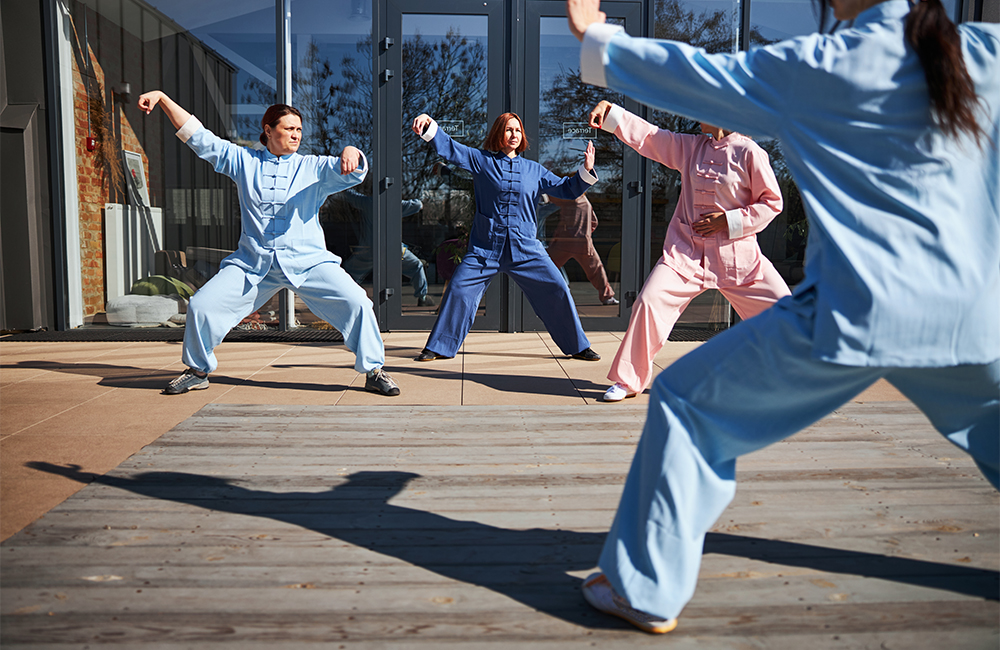by Jan Parker

As a Qigong instructor, I begin each workday with other alcoholics and drug addicts in recovery at the Orchard Recovery Center on Bowen Island in British Columbia. Encouraging a daily practice with others in the early stages of their recovery is a gift that pays off for all of us.
As a sober alcoholic, I understand the importance of being persistent in a program of recovery. Daily rituals and practices help addicts on the road to recovery, and developing the Qigong program at the Orchard helped me gain insights into my own ritual.
Qigong (pronounced chee — gong)has ancient roots in China and loosely translates to energy or vitality work. It can be as easy as gentle stretching and as deep as meditation. The practice of Qigong soothes and smoothes life’s bumps and bruises. Qigong has been shown not only to ease the symptoms of withdrawal, but it can also strengthen and calm us as we begin the treatment process. We can then carry these tools with us to help with the everyday challenges we all face in life. Qigong may not be for everyone, but by taking an active role in acquiring better health, and with a consistent input of time and energy in some regular and meaningful practice, we strengthen the foundation that supports recovery for the long haul.
I began a daily practice in 1986, my second year of recovery. Stepping outside first thing in the morning and taking a deep breath was how it started. Slowly over the years, I added stretching and gentle movement.
Some people pray when they wake up, while others work out at the gym or go for a run. I don’t think one practice is better than any other; what’s important is that you participate on a regular basis in an activity that supports and inspires you — something that provides comfort when times get tough. Addicts are strong people with strong ideas. It is all or nothing with us. “Easy does it” is elusive. We confuse inner peace with boredom. But recovery is all about time and work. Addicts get intoxicated specifically to avoid feeling what is going on inside of us, and it is easy for us to fall back into habits that allow us to quit, give up and move on. We tend to chase a feeling of what may be or what was, rather than accept the reality of now. When things get really rough, it is easy to give up on the work we are doing and hope the next new thing will be the thing that helps.
Over the years, I’ve met people who dabble at a practice. They try a class — dance, meditation, or martial arts—and enjoy the benefit of starting to feel better, but soon it becomes inconvenient or, more likely, hard. Emotional or physical stuff
comes up that can be messy and hard to look at when we get quiet. It seems easier to give up, try something else, or worse — relapse. It takes effort to stay and do the work again and again, no matter how we happen to be feeling on any given day.
How do we learn new things when our life routine seems settled? Where is the switch we need to flip to change? How do we become passionate, dedicated, and enthused enough to shake up the day, again and again — adding new information, working with that knowledge, and making it our own?
Giving yourself the gift of a regular daily practice that serves your well-being is one way to find comfort, support, and inspiration. Still, there is a huge difference between wanting to be sober and being sober, wanting regular practice and practicing.
There are a lot of ways to begin.
Look at how you can adapt the rituals you already have in your life. Perhaps you check your email first thing in the morning: Then, subscribe to a daily inspirational email and take the time to read and think about the meditation before getting on with your day. When you go outside, take a moment for a deep breath — stretch your arms in the sky. Do it again. Write or sit in silence as your morning coffee brews. Sign up for a class or join a choir that meets every week. It may not seem like much, but it’s a start of a practice that you can build on—but only if you continue.
Whether it is Qigong or meditation, mindful practice is a tool that can make recovery easier. I can think of a million reasons to do this, but none is more important than simply to feel better. When we feel better, we do better. And it’s personal. I practice sobriety, in the same way, I practice Qigong. I do it one day at a time — no matter what.
Three more reasons to try Qigong:
10 days is all it takes. True, you’re going to get a lot more out of a qigong routine if you stick with it, but researchers have found that just 10 days of qigong practice reduced stress and inflammation.
It’s better than “Thinking of Nothing.” The practice of qigong activates parts of the brain involved in attention and self-reference. The very act of making the movements becomes like a physical doodle – clearing your head and opening your mind. Meditation by “thinking of nothing” works differently, requiring active control and thought suppression.
Bigger brains, better ideas. Elderly test subjects who added qigong to their routine saw an increase in brain volume and improved cognition beyond those who added socializing or walking instead.
Jan Parker is a Taiji and Qigong expert.



No responses yet